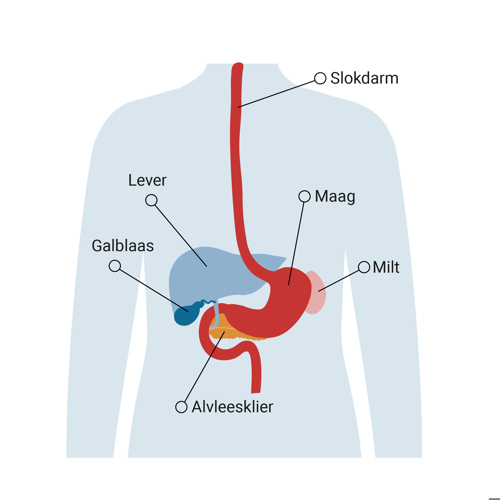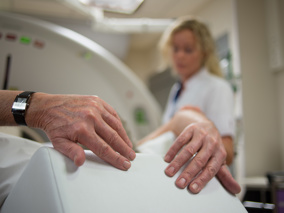Esophageal cancer
Esophageal cancer originates in the lining of the esophagus. Another name for esophageal cancer is esophageal carcinoma. There are two types of esophageal cancer: squamous cell carcinoma and adenocarcinoma. Squamous cell carcinoma starts in the mucous membrane that is in the esophagus (this is called the squamous epithelium). An adenocarcinoma usually starts at the bottom of the esophagus. There is another type of mucous membrane that resembles the gastric mucosa.
On this page you can read more about the symptoms, examinations and treatments for esophageal cancer.
Learn more about esophageal cancer
Causes of esophageal cancer
The exact cause of esophageal cancer is not known. There are things that make it more likely. This doesn't mean that you can't get esophageal cancer without these things.
Squamous cell carcinoma is equally common in men and women. People who smoke and drink a lot are more likely to develop this type of cancer. Adenocarcinoma is more common in men. It may be that stomach acid flowing back into the esophagus causes this type of cancer.

Symptoms of esophageal cancer
In the beginning, esophageal cancer often does not cause any symptoms. The symptoms usually only occur when the tumor has already grown or when there are already metastases.
The most common symptoms are:
- Food does not sink properly through the esophagus
- Difficulty swallowing
- Lose weight
- Pain behind the sternum while eating
Waiting
We want to inform you as well as possible about the waiting time per condition. We do this based on a prognosis of the current waiting list. The waiting time can vary from patient to patient for various reasons. Your attending physician will give you more information during your outpatient consultation.
-
7 days
First appointment
This is approximately how long it will take until you have your first appointment
-
5 weekdays (max)
Multidisciplinary clinic
Every wednesday we over a multidisciplinary clinic for stomach and esophageal cancer. Your wait time will depend on the time of referral. Most new patients can come in on the following Wednesday.
-
7 days
Second opinion esophageal cancer
This is approximately how long it will take before you come in for a second opinion at the NKI
 nl
nl





